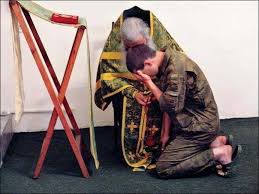
Recently I was reading a foreign-language newspaper (well, the English part of it) and there was an article in it about the church. My eyes were first attracted to the article by a photo of an old priest in a stole, having a long white beard, and holding a prayer rope (not the photo at left). The article accompanying the photo read as follows: “The monk priest Fr. (name withheld) came from (a foreign monastery) just before Pascha to hear confessions of the faithful. Many people are more comfortable going to confession with a priest that they don’t know rather than their own parish priest so Bishop (name withheld) organized for Father to travel to various churches across the country for that purpose.” This revelation caused my brain to stall out a bit, so that I had to read it again to make sure I was reading it correctly.
I will not comment on the particulars of the situation. But I do think it worthwhile to reflect on the idea that confession to our own parish priest makes us uncomfortable.
By anyone’s figuring, confession is not a sacrament calculated to increase our comfortable feelings, just as making a list of our sins is not calculated to give us the warm fuzzies. Going to Holy Communion on Sundays, or receiving sacramental anointing when we are sick can be a great comfort and solace, but no one that I know approaching the time when they make their regular confession says to himself, “Gee, I can hardly wait to tell my priest all the horrible things I have done.” There is of course the relief and blessing that come from receiving absolution, but that comfort comes at the end of the confession, not at the beginning. Let’s be honest: in many ways going to confession is like going to the dentist—you really need to go, and are glad that you went after it is over, but no one really looks forward to it.
Going to confession to one’s parish priest is only psychologically possible because one regards him as a father. Confession is usually made to one’s parish priest because Orthodox life is lived in a family called a parish, and the priest is the head of that family, functioning in it the same way that a father functions in any other family. A father is someone who loves and watches over and protects us, and we can share the things that cause us shame because of that loving and watchful protection. The priest is not like anyone else in the parish, most of whom we would never dream of sharing our secret and shameful deeds. The priest is different. He is our papa, and as such we can allow ourselves to be vulnerable with him, such as we are in confession.
It is just here that going to another priest to avoid feeling uncomfortable with our own parish priest becomes problematic, for this refusal to be vulnerable with our parish priest interferes with our ability to treat him like our father. We want to see and interact with him on Sundays like we would with anyone else in the parish, smilingly confident that he will never know all the horrible things we have done. And this is problematic because when we refuse to treat our parish priest like our father, we do not treat the rest of the parish like our family. In the situation detailed by newspaper article mentioned above, the priest can sometimes become not the father of our family, but simply a paid functionary, one to whom respect (and money) is given, but a mere functionary nonetheless. And the group over which he presides becomes not our true family, but simply an association to which we belong, like the Lions Club or the Rotarians. It can be a good organization, even a holy organization, and one that does much good, but it is still simply an organization and not our family, for it does not give us our identity in the same way that a family does, even if we do sit on its board and derive social status from it.
So, it is okay to feel a little uncomfortable when we confess to our parish priest. We could, of course, avoid the discomfort and short-circuit the whole process of fatherhood and family by going to another priest whom we don’t have to look at every Sunday. Or we could cope with the discomfort by relating to the priest as to our papa. If St. Paul is correct in describing the Church as household of God (1 Tim. 3:15), the second is clearly the preferred option.
